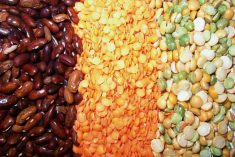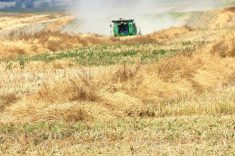Glacier FarmMedia – Expect canola futures to continue to retreat for the time being, according to broker Jamie Wilton of R.J. O’Brien in Winnipeg, Man.
“They will chop around a little bit,” he said noting the November contract could test the psychological support level of C$600 per tonne.
The Canadian oilseed began to pull back on July 8 as it became caught up in a selloff in the global oilseed market.
The November contract finished at C$658.20 per tonne on July 5, gaining more than C$31 on the week. However, by the close on July 10, that contract dropped to C$617.90.
Read Also

U.S. grains: Soybeans set 15-month high on U.S.-China trade deal hopes
Chicago soybean futures reached their highest in 15 months on Tuesday, briefly topping $11 a bushel on optimism that the U.S. could reach a trade deal with China as leaders from both countries are expected to meet in South Korea on Thursday.
With it being July, Wilton stressed that the Prairie weather will remain quite important to canola futures, suggesting any turn for the worse could quickly push values higher.
As of July 10, temperatures across Western Canada ranged from the upper 20 degrees Celsius into the low 30’s. It’s expected the good levels of soil moisture throughout most of the Prairies, along with high humidity were enough to carry the region’s crops through the hot spell.
Also, Wilton pointed to the large short position in canola as being somewhat problematic.
The United States Commodity Futures Trading Commission reported the net managed money short position in canola futures tacked on 5,000 contracts to exceed 134,700 contracts as of July 2.
Wilton warned there are “big crops and a larger carryout on the way.”
While Agriculture and Agri-Food Canada stuck to its estimate of 18.1 million tonnes of canola in its June report, other sources projected a larger harvest. Some private consultants said canola could reach or exceed 20 million tonnes.
Despite canola’s development being somewhat delayed, the trade believes the crop should easily catch up with the hot weather.












